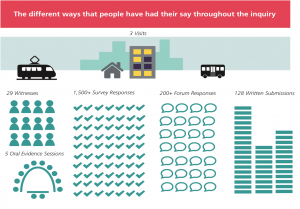Older people (aged 65 and over) now make up around 20% of the total population in the UK according to the Office for National Statistics. That proportion is heading towards 25% by mid-century. How is the government addressing the housing needs of this group of households? This is a particularly important question considering that suitable, comfortable, and well-situated homes can improve a person’s quality of life, including physical and mental health, wellbeing, social life, and autonomy. But it is also important because older households are gumming up the housing market by staying in larger homes often unsuited to their needs.
 Earlier this year the Housing, Communities and Local Government Select Committee published a report focusing on the housing needs for older people. LSE London’s Christine Whitehead served as a specialist advisor for this report which sets out recommendations to address the housing needs of this group. The report was the accumulation of a thorough inquiry that included responses from local authorities, housing developers and providers, academics, think tanks, and members of the public. The most prominent themes the report addresses include the provision of advice and information, the relation between housing and health, housing options and supply, and the overall need for a national strategy.
Earlier this year the Housing, Communities and Local Government Select Committee published a report focusing on the housing needs for older people. LSE London’s Christine Whitehead served as a specialist advisor for this report which sets out recommendations to address the housing needs of this group. The report was the accumulation of a thorough inquiry that included responses from local authorities, housing developers and providers, academics, think tanks, and members of the public. The most prominent themes the report addresses include the provision of advice and information, the relation between housing and health, housing options and supply, and the overall need for a national strategy.
One of the central aspects the report identified was the need for high quality information and independent trusted advice for older people on housing. This is key to helping older people make informed, planned, and timely choices so they can live healthy and comfortable lives either in their existing home or if they move to more suitable accommodation. Advice services need to go beyond what is currently online, partly because a considerable percentage of this population does not use the internet but mainly because the range of issues is wide and topics are interlinked and individual. With these specific needs in mind the report supports the expansion and re-funding of the FirstStop Advice Service currently led by the Elderly Accommodation Counsel (EAC). This refunding would allow for the national telephone advice service to be expanded restoring the capacity to provide personal advice, guidance, and support supplementing online and literature in hard copy and other accessible formats.
The health and wellbeing of older people is impacted by three key housing-related aspects: cold/damp, the risk of falls, and the location of the home. The cold can cause chronic illnesses which can lead to reduced mobility, falls, and depression. The report recommends signposting people to the Energy Saving Trust’s telephone advice line, helping those in fuel poverty through a national scheme that could resemble similar schemes to the Affordable Warmth Scheme in Northern Ireland and Wales. In relation to falls and other accident, the report recommends a concerted effort on local and national level to include better advice and information about repairs, maintenance, and adaptations; wider access to the services of Home Improvement Agencies and handypersons to facilitate adaptations; as well as more efficient and flexible access to use Disabled Facilities Grants. The location of the home is another aspect of housing that affects physical and mental health. To solve for this the report recommends that developers, central government, and local authorities make concerted efforts to identify suitable sites that are well connected to transport and local facilities, services, and amenities.
Moving and the availability of suitable housing are major concerns that affect older people. The report once again recommends proper advice and help with different aspects of moving, housing options, finance including mortgages, and alternative tenures. A percentage of respondents noted that stamp duty was a barrier, but the Committee felt that most older homeowners would have made capital gains and exempting them from stamp duty would not make a significant difference to the numbers downsizing or ‘rightsizing’ while any exemption would be difficult to implement. More generally, the report recommends that the Government should encourage lenders to improve the service they provide to older customers and to be more prepared to lend on specialist housing. The Government should ensure better access to social rented housing where options for older social tenant are currently limited, as well as shared ownership and Help to Buy. A broader range of housing (including extra care, sheltered, and accessible housing) should be built across both the social and the private sector and planning issues which tend to limit such provision should be addressed.
Finally, the Committee argued that these recommendations together with consultation with older people and those who provide for them should form the basis of a new national strategy for older people’s housing.
Click here to access the Government’s report.
For our other research outputs on the concerns of older people’s housing see:
- Our written evidence submitted to DCLG Select Committee’s Housing for older people inquiry
- Will the private rented sector continue to grow? Our report for Shelter
- The Future Social Housing Provider, report for Flagship Housing Association
- Alternative housing development in London: Practices and possibilities
- Reflections from an outsider – Older Women’s Cohousing (OWCH, Barnet, North London)





